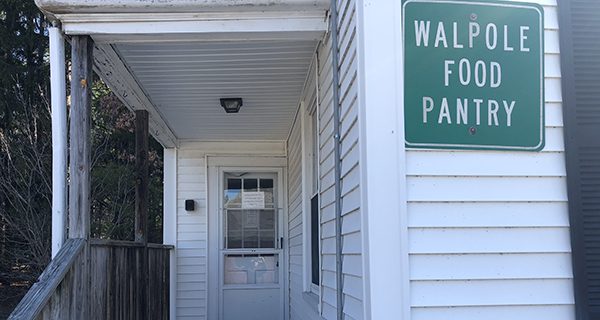By James Kinneen
Hometown Weekly Reporter
Watch the news these days and you’ll eventually stumble on someone fighting about coronavirus preparedness: who should’ve bought what, where funds should have been allocated, and what policies should have been enacted. Luckily for the people of Walpole, the Walpole Community Food Pantry has been expanding for years. The result: in this incredibly trying time, it is able to get food to the increasing number of people in need.
The Pantry used to be a place where people would shop for emergency food. But in 2018, the Pantry Board of Directors partnered with the Greater Boston Food Bank and a couple of grocery stores, increasing the amount of available food so much that they used to distribute around 4,500 pounds of food per month. Earlier this year, the Pantry was distributing about 25,000 pounds of food per month.
This March, they distributed over 37,000 pounds.
This collaboration has been especially helpful lately, as the Pantry stopped accepting community food donations in mid-March due to fears of coronavirus infection. As Walpole Food Pantry Co-President Bill Willoth explained, while there is no good time to deal with a crisis like this, the work the Pantry has done over the years is paying off in a huge way.
“We partnered with the Greater Boston Food Bank in January 2018, and in March of 2019, we applied for a capacity grant, which is a matching grant where if we show [that] a need for refrigeration or transportation or plumbing or whatever will help us increase our outreach, they will consider giving us a matching grant. In March 2019, we were awarded the largest grant they’ve ever given out - almost $30,000 - and we matched that with other donations. With that, we were able to buy a brand-new refrigerated van, which has been a godsend. We’re just very fortunate with the timing that we expanded beyond the Pantry and had a system in place that with the help of the town, [it] meant we could do all this.”
That’s not to say the Food Pantry hasn’t had any help. Willoth pointed out that while the Pantry has expanded over the years, the coronavirus has forced them to shift their distribution model in a major way. With the Senior Center (Council On Aging) shut down, they can no longer hold their pop-up events every week, where 60-70 seniors would get food through the Senior Center. Now, the Senior Center itself (as well as the high school) is acting as a distribution center, where food is stored (the high school is letting them use their refrigeration units). To help with this new model, people from the COA, the high school, the Recreation Department, the library staff, the DPW, and other volunteers through the Walpole Medical Reserve Corps are helping store, pack and deliver food.
“The COA has two vans, and we have a refrigerated van at the Pantry. So, we put all the perishables in the refrigerated van, and the COA van drivers, Carol and Jim, under the direction of Kerri McManama, Director of the COA, and Debbie Fradkin, Assistant Director, go out in their two senior citizen vans, and we follow to both Housing Authority facilities and deliver the food. Then, the COA vans go back to the Senior Center for non-perishables and the refrigerated van goes to the high school for perishables, reload, and have the volunteers from the Walpole Medical Reserve Corps come through the COA parking lot in five-minute intervals. We have probably 12-15 volunteers coming through, and we give them between three and six boxes in each vehicle, one box per household. Then, they leave the loading area for the shelf-stable foods and come over to the refrigerated van, where we give them three bags of perishables - one with the protein, one with the dairy, and one with fruits and vegetables - so they end up delivering to each household three bags and a 45-pound box. From the COA last week, we delivered to 98 residences. And then, they do a similar thing at the high school, where Maria Hall, the head nutritionist for the Walpole School Department, and some maintenance department and procurement staff, along with volunteers, pack things up and deliver themselves. Every other Saturday they ship out what comes out to about 7,500 pounds of food to approximately 65 families.”
The town, under the direction of Town Administrator Jim Johnson and Assistant Town Administrator Patrick Shields, has been a tremendous help to the Pantry. When this crisis first broke, they told Willoth: “Just tell us what you need.” They have provided all that's been asked for.
While the Food Pantry used to require income documentation for repeat clients, Willoth noted that nowadays, “that’s all out the window. During this emergency, anyone that calls the COA or contacts the Pantry and says that they’re in need of food, we get it to them … We are hopeful that people do not abuse the system. This is not a program for convenience, it’s for those that are truly in need and have no other options."
But while the Food Pantry’s expansion, and the hard work of many people has left it in a good place, they do still need some help. While Maria Hall’s advocacy through the school system has given the Pantry an uptick in donations, the expenses the Pantry now deals with are so much higher than before.
“We have to purchase things we’ve never had to purchase before, like bags. Bags cost 50 dollars for 300 bags, and the number of bags we’re sending out every month is huge. We have to purchase gloves now. We had to rent a truck because we had a large delivery. We have to purchase food that was once donated, by individuals and by stores through their donation programs. The individual donations from the bins at the grocery stores and the library are no longer being accepted. Food from the many food drives area groups have generously provided in the past [is] not coming in, and the food being donated by local grocery stores has dwindled to about 25 percent of previous levels. With the stores having a difficult time keeping product on the shelves, there is less to donate. The four months prior to this - so from November 2019 through February 2020 - we were spending at Greater Boston Food Bank an average of $247.54 per month. The month of March, we spent $2,705.55. So, we’re spending more than ten times the amount now. That’s how much we’ve spent on food. In addition to that, there’s the amount of gas we spend going into Boston three times a week rather than once - we have had to rent a truck, so the expenses have gone up significantly.”
With these new expenses, the Pantry could use financial help. So, while it’s great that so many residents are looking to help through volunteering, by far the best way to help the Pantry at this point is with a monetary donation.
“We’re finding everyone wants to help, but we have lots of volunteers to put these things together, and we’re actually trying to ration volunteers because of social distancing. So, when people ask us ‘what do you need’, the answer is that we need financial donations. In order to provide this for the town, we need financial support.”
If any resident is in need of food or essential non-food items, contact the COA on Monday or Tuesday from 9:00 a.m. to 3:00 p.m. at (508-668-3330, Option 8).
To learn more about this program or make a financial donation to the Walpole Community Food Pantry, visit www.wcfp.org.























